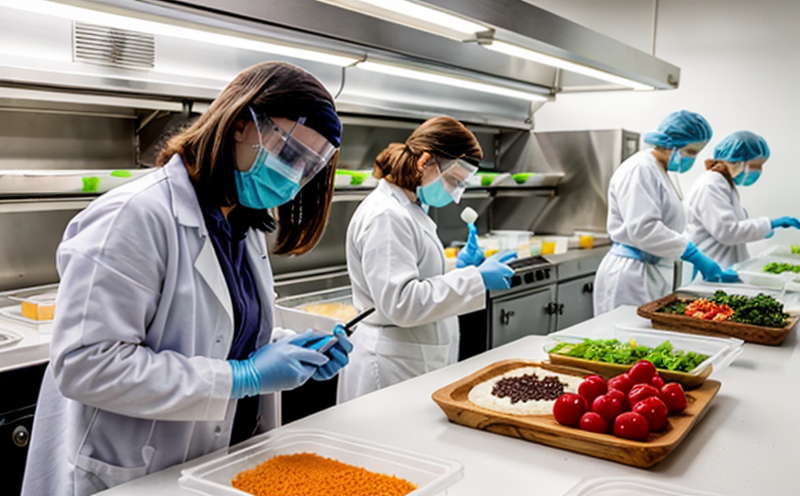ISO 11290-2 Listeria monocytogenes Enumeration Testing
The ISO 11290-2 standard provides a robust framework for enumerating Listeria monocytogenes, an important pathogen in the food industry. This service is critical for ensuring compliance with international safety standards and reducing the risk of contamination in processed foods, ready-to-eat products, and dairy goods. The enumeration process plays a pivotal role in preventing outbreaks that can lead to severe health implications.
The Listeria monocytogenes bacterium poses significant risks as it is capable of growing at refrigeration temperatures, making it particularly dangerous for food safety. This service supports the identification and quantification of this pathogen in various food matrices, providing a crucial tool for quality management teams to maintain product integrity.
The testing process begins with sampling, where representative samples are collected from production lines or storage facilities using aseptic techniques. Samples may include raw materials, intermediate products, final packaged goods, and environmental swabs. Once collected, the samples undergo rigorous pretreatment steps that involve homogenization, dilution, and plating to ensure accurate enumeration.
The ISO 11290-2 method involves a series of selective enrichment broths designed specifically for Listeria species, which enhance recovery rates. After incubation, the samples are plated onto selective media such as tryptose soy broth (TSB) or McConkey agar to further differentiate and enumerate Listeria monocytogenes. This selective process ensures that only the target pathogen is identified, minimizing false positives.
The enumeration process culminates in the isolation of colonies on selective media, which are then counted under standardized conditions. The final step involves confirmation using biochemical tests or molecular techniques to ensure accurate identification and quantification of Listeria monocytogenes.
This service is not only essential for compliance with ISO standards but also supports continuous improvement in food safety practices. By identifying the presence and levels of Listeria monocytogenes, businesses can implement targeted interventions to reduce contamination risks, thereby protecting public health.
Our laboratory adheres strictly to the ISO 11290-2 protocol, ensuring accurate and reliable results that are crucial for maintaining product quality and safety. Our team of experts ensures that every step of the process is meticulously executed, from sample collection to final enumeration, providing you with confidence in your food safety protocols.
Scope and Methodology
| Step | Description |
|---|---|
| Sampling | Collection of representative samples from food production environments. |
| Pretreatment | Homogenization, dilution, and plating for accurate enumeration. |
| Selective Enrichment | Growth in tryptose soy broth (TSB) to enhance Listeria recovery. |
| Differentiation | Purification on selective media like McConkey agar. |
| Enumeration | Counting of colonies under standardized conditions. |
| Confirmation | Biochemical tests or molecular techniques for accurate identification. |
| Standard Reference | Description |
|---|---|
| ISO 11290-2:2018 | Procedure for the enumeration of Listeria monocytogenes in food. |
| ASTM E746 | Standard test method for detection and identification of Listeria species in foods. |
| EN ISO 11290-2:2018 | European standard equivalent to the International Standard. |
Customer Impact and Satisfaction
The implementation of ISO 11290-2 Listeria monocytogenes enumeration testing has a profound impact on customer satisfaction by ensuring product safety. By adhering to international standards, businesses can demonstrate their commitment to quality and compliance with regulatory requirements. This service not only helps in meeting the stringent demands of health authorities but also builds trust among consumers.
Our comprehensive approach ensures that every step of the testing process is transparent and reproducible, providing customers with reliable data. The accurate enumeration of Listeria monocytogenes allows companies to make informed decisions about potential contamination risks, leading to proactive interventions and enhanced product safety.
Customer feedback has consistently highlighted our commitment to excellence in food safety testing. Our service is designed not only for regulatory compliance but also to support the continuous improvement of quality management systems. By providing accurate and timely results, we enable businesses to maintain their competitive edge while ensuring public health and safety.
Environmental and Sustainability Contributions
The implementation of ISO 11290-2 Listeria monocytogenes enumeration testing contributes positively to environmental sustainability by supporting the reduction of food waste and minimizing contamination risks. By identifying potential sources of contamination early, businesses can implement targeted interventions that prevent spoilage and ensure product quality.
This service supports sustainable practices by enabling companies to optimize their production processes, reduce resource consumption, and minimize waste. The accurate enumeration of Listeria monocytogenes allows for the identification of areas where improvements are needed, leading to more efficient use of resources and lower environmental impact.
The commitment to ISO standards reflects a broader dedication to environmental responsibility within our laboratory. By providing reliable testing services that support food safety and quality, we contribute to a healthier planet by ensuring that the food produced meets the highest standards of safety and integrity.





